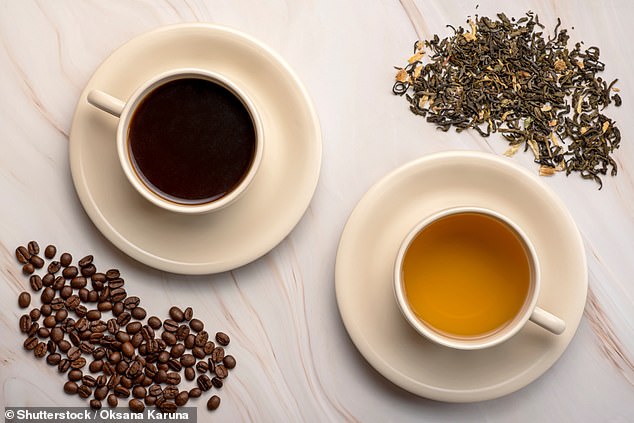What is better for your health, coffee or tea?
Both claim to have a number of health benefits, including increasing energy, reducing inflammation, and reducing the risk of heart disease.
But when it comes to heart attack or stroke risk, one seems to reign.
An international study of more than 25,000 people found that drinking more than four cups of coffee a day increased the risk of having a stroke by almost 40 percent.
Meanwhile, the same amount of tea reduced the risk by almost a fifth.
Experts have long debated whether coffee or tea has more health benefits. However, a new study suggests that coffee may increase the risk of stroke, while tea reduces it.
The researchers suggested this could be because frequent coffee drinkers may be more likely to have heart problems such as high blood pressure, which increase the risk of stroke.
In the study, published in July in the International Journal of StrokeThe researchers recruited 26,950 adults from 32 countries, including the United Kingdom and Canada, about half of whom had survived a stroke in the past few days.
On average, patients were recruited approximately two and a half days after suffering a stroke.
The average age of the participants was 61 years and the majority were men. Most patients were also overweight, a risk factor for stroke.
Participants completed questionnaires about their medical history, diet, physical activity, and other stroke risk factors such as smoking and high blood pressure.
They were also asked how many cups a day they drank of coffee, Chinese/Japanese green tea, black tea, and other types of tea.
About one in five participants drank no beverage, while almost half stuck to tea only. About 15 percent drank coffee alone, while nearly one in five consumed both.
The team found that drinking four or more cups of coffee a day increased the risk of stroke by 37 percent. However, drinking the same amount of either type of tea reduced the risk by 19 percent.
Black teas, which include Earl Gray and breakfast tea, had the lowest overall risk of stroke at 29 percent, while green tea reduced the risk by 27 percent.
There was no link between drinking three or fewer cups of coffee and stroke.
Researchers noted that excessive coffee consumption may have such a detrimental effect because those who drank so much coffee tended to have higher rates of problems such as high blood pressure and high heart rate.
Coffee has higher levels of caffeine than tea, with about 80 to 100 milligrams per eight-ounce cup compared to 50 in tea.
Caffeine has been shown to promote the release of adrenaline, which increases heart rate and blood pressure.
Over a long period of time, these effects can damage blood vessels in the brain, increasing the risk of clots and strokes.
However, the researchers noted that adding milk to any type of tea negated any potential stroke-related benefits.
The team did not look at the impact of sugar, syrups, spices or other add-ins to coffee or tea.
The team said this could be because milk blocks antioxidants, disease-fighting molecules found in both coffee and tea that have been shown to reduce inflammation that could lead to a stroke.
There were several limitations to the study. The researchers noted that the findings could be subject to recall bias, since the participants suffered a stroke just days before they were interviewed.
Additionally, participants from China and South Asia made up the largest demographic group. As tea is particularly popular in these areas, there could be potential bias.


